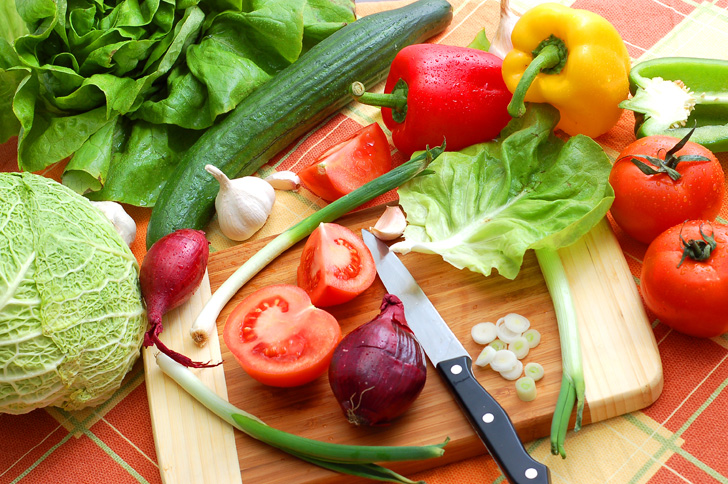Why Whole Foods?
Our first priority is to eat whole, fresh foods. This is what makes us healthy; it’s also what we have been genetically designed to eat – what is found in nature, not what is created in laboratories or mass food-producing factories utilizing chemicals. Today, so many of our foods have no resemblance to what one would find out in nature. These foods are simply a concoction of man-made chemicals and manufacturing processes that are sold as food. For now, let’s concentrate on whole foods.
A loose definition of “whole foods” is that the food is eaten in the form as close to the way it’s found in nature as possible, with minimal to no processing. There are obvious variances and limitations to these criteria, depending on the food. For example, foods such as fruits, vegetables, nuts and seeds should be eaten in their raw state, which provides the highest level of nutrients (i.e. fiber, phytonutrients, antioxidants, enzymes, water, etc.). When those foods are frozen, canned, baked, fried, salted, etc. and/or prepared with other processed foods (e.g. an apple that is made into a “turnover” made with white flour, hydrogenated oil and high fructose corn syrup), they are moving away from the way they are found in nature and in the process, losing the majority if not all of their nutritive value and now have disease-promoting additive chemicals. In the apple turnover, the once naturally-found food, the apple, has now crossed the line from being simply non-nutritious to actually becoming a disease-producing food (the white flour and high fructose corn syrup are major contributors to the development of diabetes; the hydrogenated oil is a known causal agent for heart disease and cancer).
On the contrary, other foods such as olive oil, almond milk, and whole grains can only be eaten after a certain amount or degree of processing. Then there are differing degrees to that processing. For example, a cold-pressed virgin (first press) olive oil is a much better food than heat-processed oil; fresh made almond milk versus store bought almond milk differs greatly in their ingredients and nutritional make up.
The Basics
We are all part of the animal kingdom. Yes, God has made us different from other animals in many ways; but when it comes to how our bodies function physiologically, we are no different than other animals. Would you feed your pet dog, cat, bird, or rat chips, fries, soda pop, ice cream, cookies, crackers and expect them to be healthy? (By the way, Dr. Paul’s kids have pet rats – they feed them raw vegetables, nuts, and avocado trimmings/leftovers, etc.). Why not? It’s obvious, because the pet would get sick, right? But you say, “They’re animals!” Well, guess what? So are we!
It is so important that you understand this concept that we have to eat naturally for our bodies to be healthy. Our bodies are made up of between 70 – 100 trillion cells – and those cells will function according to the raw materials we provide. In other words, the health of our cells and therefore the health of our bodies is determined by the food we feed ourselves. YES, IT’S THAT SIMPLE! Perhaps no other single factor has contributed to the decline in man’s health than the (self-imposed) changes that have occurred to our food supply over the past 350 years.
So what is meant by whole foods? First, when we are considering what is a “good” food and what constitutes a “bad” food, we must think in simple terms: is this food made by God (or nature) or made by man? As man became more adept at modifying his environment, he also began to modify (i.e. process) the foods he ate and/or grew. These changes in the way food is grown, harvested, processed and packaged has rendered most foods found in your large-chain supermarkets void of nutrients and loaded with toxic chemicals, additives and by-products. As a direct result of this industrialized food processing, during this time there has been a parallel increase in the incidence of heart disease, cancer, diabetes, obesity, senile dementia (i.e. Alzheimer’s and Parkinson’s), allergies, asthma, and childhood obesity.
Food Quality and Its Effect on Your Health: Garbage In = Garbage Out = Disease
That idiom – “garbage in – garbage out” – became popular when computers became commonplace. It was known that whatever “stuff” you put onto your computer’s hard drive would determine the functioning or output of the computer. This is even more critical with regard to our health when we consider how the raw materials we provide from the food we eat supplies the cells of our bodies, which then determine the health and longevity of the body itself. This includes every aspect of our body’s health – how your brain will function (now and in old age), the ability of your body’s immune system to fight everything from colds and flu to cancer, to whether your joints will degenerate with arthritis or not, and whether you will remain sexually active in old age (okay, did that get your attention?).
We Are What We Eat
When you go into a fine steakhouse, they will often advertise the fact that they serve “Corn-Fed Beef.” The idea is that when cattle are fed corn, then the steaks will taste good (please keep in mind that the way to fatten a cow before sending it “to market” is to feed it grain (or corn) – so, when we humans eat grains, particularly processed or refined grains in excess, we also get fat). Dr. James Chestnut calls America “a huge feed lot” because of our over-consumption of grains, and correctly attributes our obesity epidemic to this fact (along with a sedentary lifestyle and chronic stress). In the preindustrial era, two huge factors prevented people from suffering the ill effects of eating too much grain-derived foods: 1) the technology to refine grains to the point where there is virtually no nutrition left was undeveloped; 2) people ate course, unrefined grain products.
Choose Carefully What You Put on Your Fork
When you think about it, every bite we take will move us either toward health or away from health (that is, our bodies – the cells in our bodies).
When primitive, hunter-gatherer-type cultures are studied, a consistent finding emerges: without processed food, the human body thrives without heart disease, cancer, diabetes, arthritis, obesity, acne, asthma, constipation – all the conditions or diseases that are so common today in industrialized countries eating processed food.
Top 10 Disease-Producing Foods That Must Be Avoided:
1. Artificial sweeteners: Aspartame (i.e. Nutrasweet and Equal) and Sucralose (i.e. Splenda) cause altered brain chemistry and cancer.
2. Hydrogenated oils (also known as trans-fats)
3. Fried foods (this includes chips)
4. Milk and milk products (butter, ice cream, yogurt, etc.)
5. Soda pop (Diet or Regular)
6. White flour foods (breads, pasta, cakes, cookies, crackers, etc.)
7. Cured meats (bacon, sausages, and lunch meats; anything with nitrates, nitrites)
8. MSG (monosodium glutamate; now disguised as hydrolyzed yeast extract, etc.)
9. High fructose corn syrup (found in many foods – too many to list; see “HFCS” article)
10. Artificial Food Colorings (red, blue, and yellow dyes are used widely in many foods. Like MSG, they are neuroexcitotoxins and a contributory factor in attention-deficit disorder and hyperactivity)
Pesticides: Organic vs. Commercial
The Environmental Working Group is a nonprofit organization that advocates for policies that protect global and individual health. They currently tested 43 different fruits and vegetables, and found that these 12 carried the least amount of pesticides when grown conventionally:
* Broccoli
* Eggplant
* Cabbage
* Banana
* Kiwi
* Asparagus
* Sweet peas (frozen)
* Mango
* Pineapple
* Sweet corn (frozen)
* Avocado
* Onion
Of the 43 different fruits and vegetables tested, the following 12 carried the highest amount of pesticides when grown conventionally, and are therefore the most important to buy organic:
* Peaches
* Apples
* Sweet bell peppers
* Celery
* Nectarines
* Strawberries
* Cherries
* Lettuce
* Grapes (imported)
* Pears
* Spinach
* Potatoes
STEP ONE: When Making Change – Positive Additions First
When making any lifestyle change, whether getting started on a new dietary regimen or a new exercise program, it’s always better to start by adding good or positive things first and discontinuing or removing bad habits later. By taking the “add positive first” approach, there isn’t the psychological aspect of self-deprivation slowing you down. For example, if your goal is to get in shape, then going to the gym (okay, you have to join the gym first) on your way home from work or going for a walk after dinner is better than beating yourself up by saying, “I’ve got to stop sitting on the couch watching TV so much.” If you start going to the gym, by default you will sit around watching TV less when you fill that time instead with positive actions and activities.
When it comes to making dietary changes, adding positive is just as important, and for the same reasons. Rather than beginning a new nutritional regimen by trying to stop eating all the bad foods you enjoy and feeling deprived of your favorite mid-morning soda or candy snack (that you may be literally addicted to), it’s better to start by adding a good breakfast, eating large salads at lunch and dinner, and bringing fresh fruit and raw nuts as snacks. You will find that your cravings for the bad junk foods (think of them as “disease foods” or “die fast foods”) decreasing. The best place to start is with whole foods.

